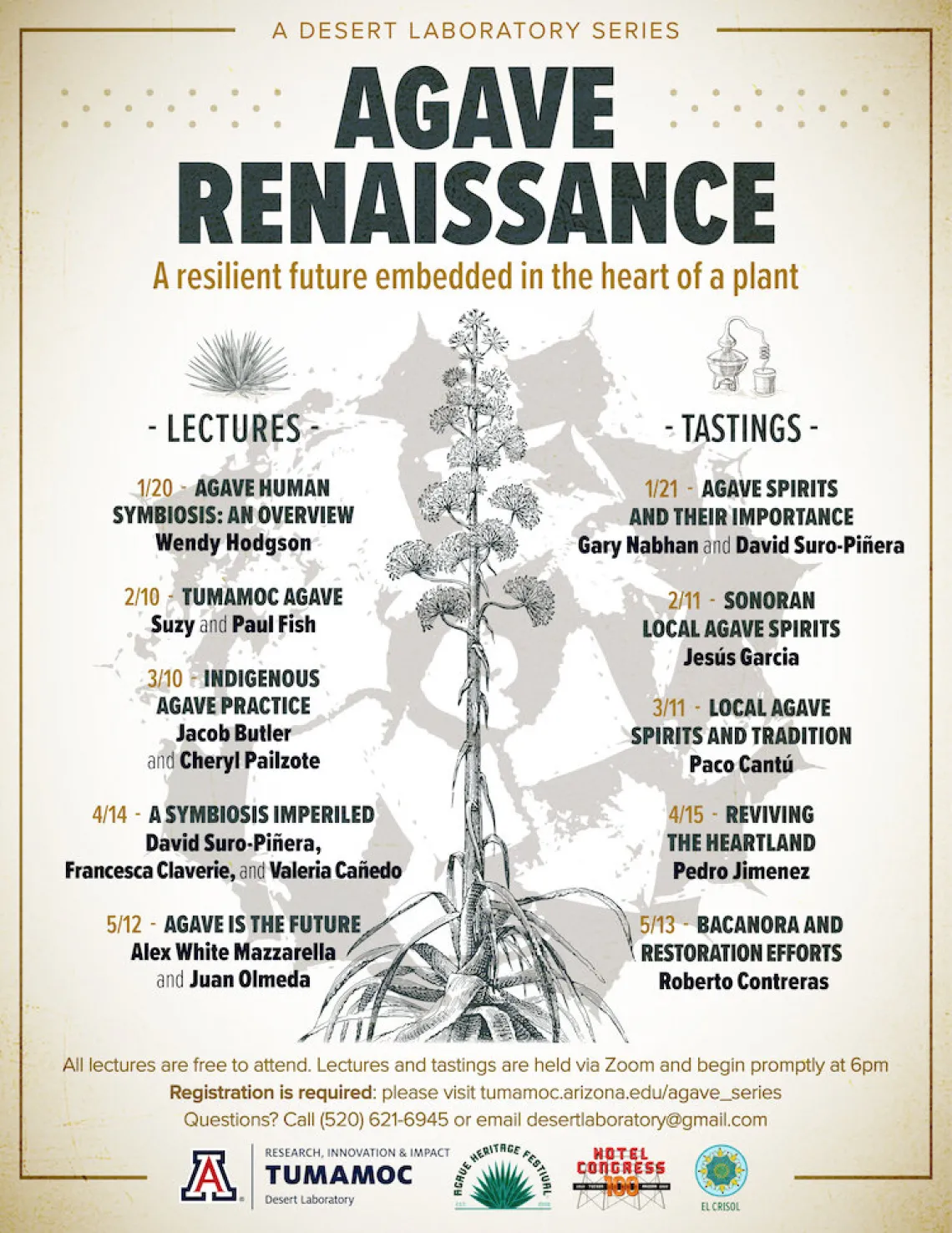Agave Renaissance
Spring 2021 Lecture Series
Agave has been a mainstay of culture in the Americas for millennia: food, drink, tool, spirit, utilitarian, sacred. Adaptations to aridity represented by both agave and people hold critical insights into how to live in the desert. This lecture series looks closely at these adaptations and the reciprocal relationship between this desert plant and people. Through presentations, roundtable discussions, tastings, and art we will collectively reconnect to the importance of agave, how this relationship in threatened by climate change and our actions, and also how a resilient future is embedded in the heart of a plant.

Participate in the tastings
For this series, Club Congress and El Crisol will be offering tastings of agave spirits. If you'd like to participate, register for the presentation portion of the tasting here and click the link to the Hotel Congress Bottle Shop to make a purchase of agave spirits to enjoy at home during the presentation.
Wendy Hodgson, Herbarium Curator Emerita and Sr. Research Botanist, Desert Botanical Garden
We begin the series by taking a look at the big picture to understand how intricately linked people and agave are and have been for thousands of years. When one thinks of a close relationship between plants and people, corn, potatoes, or squash may come to mind. Yet, agave is as diversified and coupled in its relations to people—and people to it—as any other plant. These inaugural presentations will reveal a world of connections, hiding in plain sight either on a hike in the desert or in your glass at the bar.
Watch the recording
Gary Nabhan, W.K. Kellogg Endowed Chair in Food and Water Security for the Borderlands, University of Arizona
David Suro-Piñera, Owner Siembra Spirits, President Tequila Interchange Project, Co-President Bat Friendly Project
Agave Spirits:
- Derrumbes San Luis Potosi Mezcal
- Siembra Azul Blanco Tequila
- Fidencio Clasico
Watch the recording
Suzanne Fish, Curator Emerita Arizona State Museum, Professor of Anthropology, University of Arizona
Paul Fish, Curator Emeritus Arizona State Museum, Professor of Anthropology, University of Arizona
Some of the most important agave landscapes in the Southwest are in Tucson's backyard. Tumamoc Hill has a 1,500 year old Hohokam agave field at its base. This is a site where people modified the landscape in subtle yet transformational ways to capture the rain and transform it into a field of thousands of plants, cared for by generations for hundreds of years. We will also learn how Sonora has an agave culture all its own that stretches from desert flats to the deep canyons of the Sierra Madre. Bacanora is just the beginning, the diversity of species and distillate styles is as multiplicitous as the regions mountains. Agave culture is all around us, join us to see what we mean.
Watch the recording
Jesús Garcia, Education Specialist, Arizona-Sonora Desert Museum
Agave Spirits:
- Mazot Bacanora Blanco
- La Higuera Sotol
- Masparillo Mezcal
Watch the recording
Jacob Butler, Onk Akimel O'Odham and member of the Salt River Pima Maricopa Indian Community (SRPMIC), Community Garden Coordinator for SRPMIC, Board Chair Native Seeds/SEARCH
Cheryl Pailzote, White Mountain Apache Tribe, Board Member, Native Seeds/SEARCH
The use of agave by people is an unbroken string that stretches for millenia. Multiple cultures and multiple lifeways have evolved wherever agave occurs, and in many places where it was introduced by people due to its utility. The use of agave takes a myriad of forms that both remain consistent from region to region but also have an infinite variety that reflect culture and ingenuity. We will gain insight to these traditions of use in our region by Native Nations and regional producers.
Watch the recording
Paco Cantu, El Crisol
Agave Spirits:
- Mazot Palmilla
- Amormata Verde Mezcal
- Amormata Tamaulipas Mezcal
Watch the recording
Francesca Claverie, Native Plant Program Manager, Borderlands Restoration Network
Valeria Cañedo, Colectivo Sonora Silvestre, Centro de Colaboración para la Ciencia y Cultura
Lea Ibarra, Colectivo Sonora Silvestre, Centro de Colaboración para la Ciencia y Cultura
Millions of acres of monoculture Agave tequiliana. A worm in a bottle. $15 for a liter of tequila or mezcal. Domesticated agave long abandoned in what was once a thriving field. These are the hallmarks of a story gone awry. In recent centuries, the cohesive and reciprocal nature of the human-agave relationship began to slip. Fields once tended for generations were left isolated as Native peoples were killed, physically relocated, or otherwise disenfranchised. A shift in distillate production that increased quantity and profits created a rift from small-scale artisanal models to mass production, diffused, and artifically flavored tequila products based on a house of card of inbred monocultures. Yet, the heartbeat of the symbiotic relationship ticks loud and has thousands of champions and masses of supporters. Learn how the choices made by each of us can and will shape the future of agave culture in a way that honors the diversity that makes it great.
Watch the recording
Zulema Arias, Manager Mezonte
Pedro Jiménez, Director and CEO Mezonte
Watch the recording
Alex White Mazarella, Rezpiral
Juan Olmedo, Del Rincón Grande
We need models that illustrate how humans and nature can coexist. Agave is that model. These are remarkable arid adapted plants that provide tools and sustenance to both people and their pollinators. Yet they also work in concert with humans and have done so for millenia. Carefully selected, they diversify in step with the uses people ascribe to them and thrive when cared for. The answers to how to create restorative economies, sustainable foodways, and bioculturally diverse habitats and communities are all embedded in this relationship between people and plant. This is a story that has been written on the landscape from the heart of the Sierra Madre to the Grand Canyon by those who inhabited these lands before us. Now it is ours to continue and make our future.
Watch the Recording
Roberto Contreras, Rancho Tepúa
Agave Spirits:
- Rancho Tepúa Bacanora Blanco
- Rezpiral Espadin
- Real Minero Mezcal

